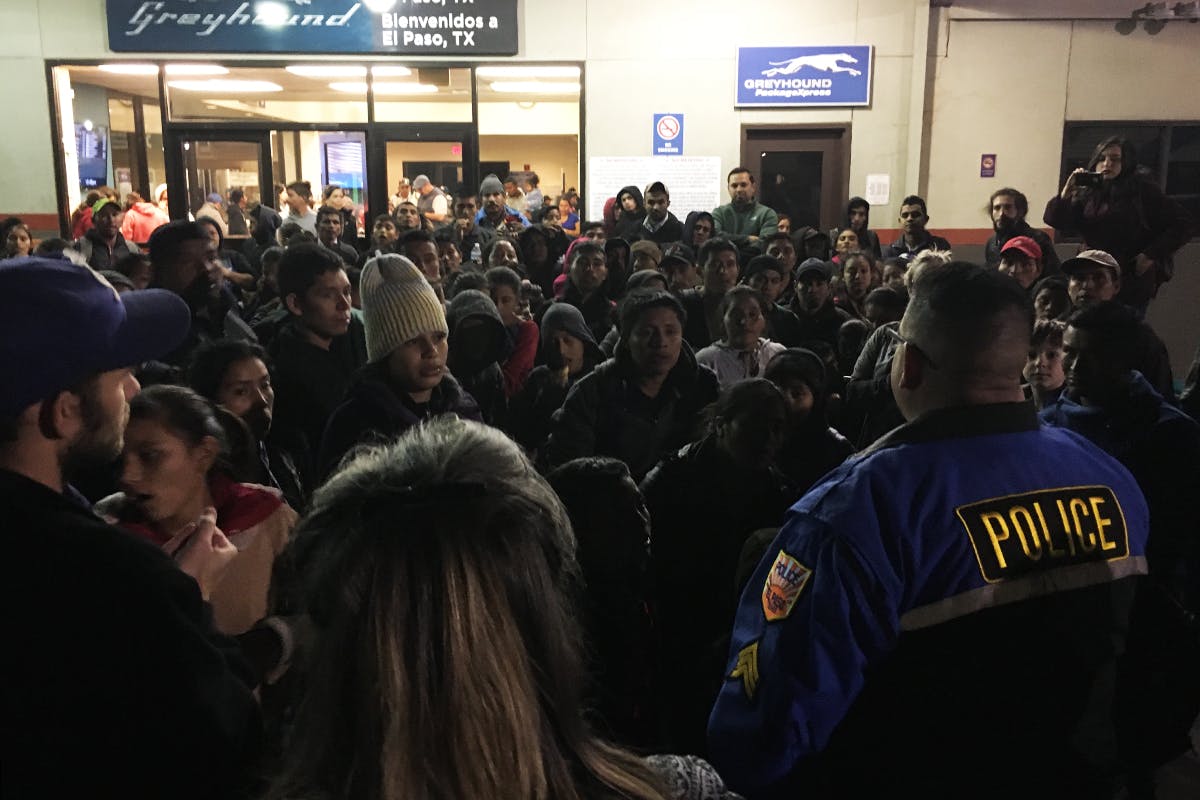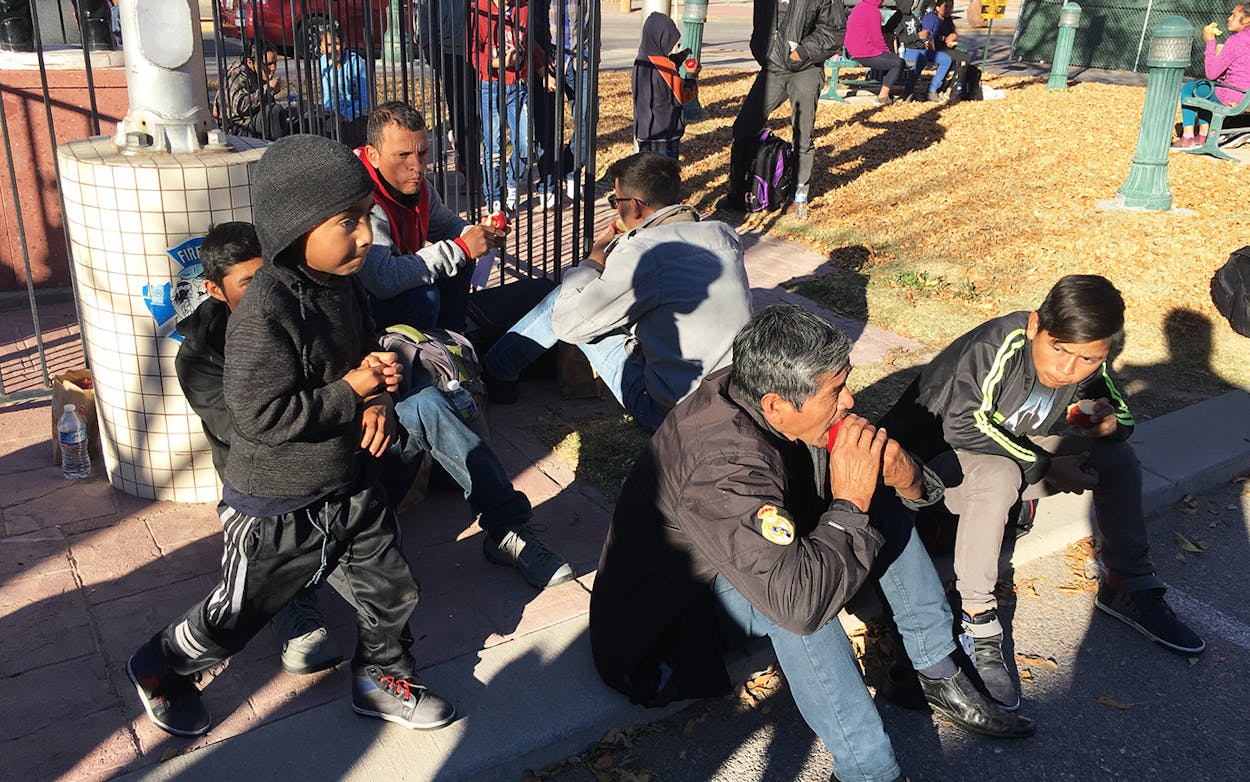Despite acknowledging that they “dropped the ball” by releasing more than two hundred asylum seekers onto the streets of El Paso without money or means of transportation—or without warning local officials—Immigrations and Customs Enforcement officials said they plan to release hundreds more over Christmas, U.S. representative Beto O’Rourke told Texas Monthly Monday. The move over the holiday has local government officials and nonprofit leaders scrambling to house and feed the unexpected onslaught of immigrants.
The move is the latest salvo by the Trump administration on the immigration front, coming as the federal government is experiencing a partial shutdown of services over an impasse on whether money should be allocated to build a border wall just blocks from where the asylum seekers in El Paso were released. Witnesses believed the move was especially insensitive coming just before Christmas and sparking chaos among volunteers and city officials intent on trying to prevent immigrants from having to sleep on the streets.
O’Rourke and other leaders said ICE reneged on a promise in October not to make large, unannounced releases of migrants into the community and instead work with nonprofits and governments to place them in shelters through an orderly process. That commitment came after ICE dropped off about a hundred migrants without notice at the Greyhound station near downtown El Paso. An ICE spokeswoman didn’t respond to a request for comment, likely because she was furloughed because of the partial government shutdown triggered by a fight between congressional Democrats and President Trump over $5 billion in funding for a border wall. O’Rourke said there was no indication that the release of the migrants without notice was tied to the shutdown.
“ICE admitted that they dropped the ball, that they made a mistake yesterday by not giving the community any kind of heads-up on releasing 214 migrants at the Greyhound bus station last night and early this morning,” O’Rourke said. “They said that they would give us a heads-up going forward, although they promised to do that before.” O’Rourke spoke at a fire station across the street from the Greyhound station, where migrant families were taken to be fed.
O’Rourke said that in addition to the more than two hundred people released Sunday and an expected two hundred on Monday, another two hundred people are expected to be released on Christmas Day and a similar number the day after. His successor in Congress, representative-elect Veronica Escobar, said the plan is to place them in hotel rooms across the city, with the cost being borne by Annunciation House, a nonprofit that has cared for migrants in El Paso for four decades.
“And that means depleting Annunciation House of its financial resources. And we’re only talking about the shelter at that point. We’re not even talking about the need for more volunteers and more food, more supplies, et cetera. So this is just a terrible crisis, during the most difficult time to get volunteers,” said Escobar, who takes office January 3. She and other El Paso leaders are urging people to donate to Annunciation House and are trying to rally community volunteers to feed the migrant families.
Federal immigration agencies for decades have had an agreement with Annunciation House to release migrants to its temporary care. ICE takes custody of people apprehended by Border Patrol for illegally crossing the border but has limited capacity for holding people long-term, especially families. Migrants generally stay at an Annunciation House shelter for a day or two while arranging transportation to join families elsewhere in the United States while their asylum and deportation cases are heard in courts. Such releases are usually carefully planned, but that didn’t happen Sunday night.
ICE buses suddenly began dropping off migrant families at El Paso’s Greyhound station at about 7 p.m. Sunday. A small group of El Pasoans began responding with food and water. My wife and I brought fifty pounds of oranges and a big box of granola bars; others brought pizza. People bringing in food were quickly swarmed by families.
Many of the migrants had no idea where they were. “El Paso, Tejas,” Greyhound employees and volunteers told them. Many asked to borrow phones so they could call relatives to begin the process of buying bus tickets to be with family elsewhere in the United States.
The decision by ICE to drop the families at a private business necessitated a response by a large number of El Paso police officers, who were redeployed from other areas to provide security and help find shelter. Five El Paso Sun Metro buses came to the scene, prepared to take the families to shelter once it became available. County judge Ruben Vogt came to the Greyhound station to coordinate emergency response. O’Rourke and Escobar worked the phones to find shelter for the families.
Eventually, Annunciation House rented additional motel rooms and found space at a Catholic school for about 150 people. Greyhound allowed another 50 or so with early morning bus tickets to stay overnight. City buses, escorted by police, took the migrants to their temporary homes between midnight and 1 a.m. Annunciation House had taken in another 200 migrants earlier in the day, filling up all of the agency’s more than 1,500 available beds. Annunciation House director Ruben Garcia said fewer bus seats are available over the holidays, so migrants are staying longer in temporary shelters, taxing his organization’s capacity.
Since October, ICE has been releasing 200 or more migrants a day to Annunciation House while the migrants work with their families to get a bus or plane ticket to join them elsewhere in the United States. The released migrants—mostly from Guatemala, Honduras, and El Salvador—generally have been found by asylum officers to have a credible fear of persecution if returned to their home countries, which allows them to begin the challenging legal process of seeking asylum in the United States.

Although media and political focus has been on the Tijuana–San Diego area because of the so-called migrant caravans, the bulk of Central American migrants crossing the border are doing so in two Texas Border Patrol sectors—the Rio Grande Valley in South Texas, and El Paso in West Texas and all of New Mexico. More than 48,000 members of what the government calls “family units” were apprehended at the Southwest border in October and November, the largest monthly numbers for such apprehensions on record. More than 34,000 of those apprehensions were in the Rio Grande Valley and El Paso sectors. Although family apprehensions are at record highs, overall apprehensions are a fraction of what they were a decade ago.
Escobar said ICE has found ways in the past to handle surges of migrant families to ensure their safe and orderly processing. In the last major surge in 2016, ICE set up a temporary processing center in the El Paso County town of Tornillo—the current site of a tent facility for migrant children—to process asylum claims and handle an orderly release to Annunciation House.
“There’s absolutely no reason why those temporary holding facilities cannot be set up once again, no reason,” Escobar said. “The blueprint exists, and frankly the money obviously exists, because the Tornillo child prison seems to get a blank check. So there’s money there. I don’t understand why federal law enforcement has failed to use this solution that worked so well in 2016.”
- More About:
- Donald Trump
- Beto O'Rourke
- El Paso






